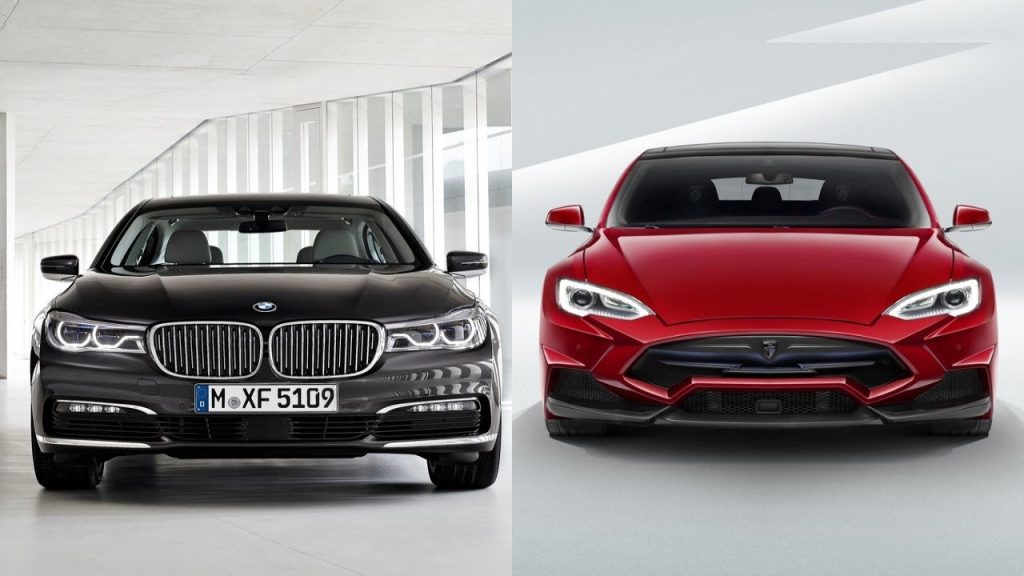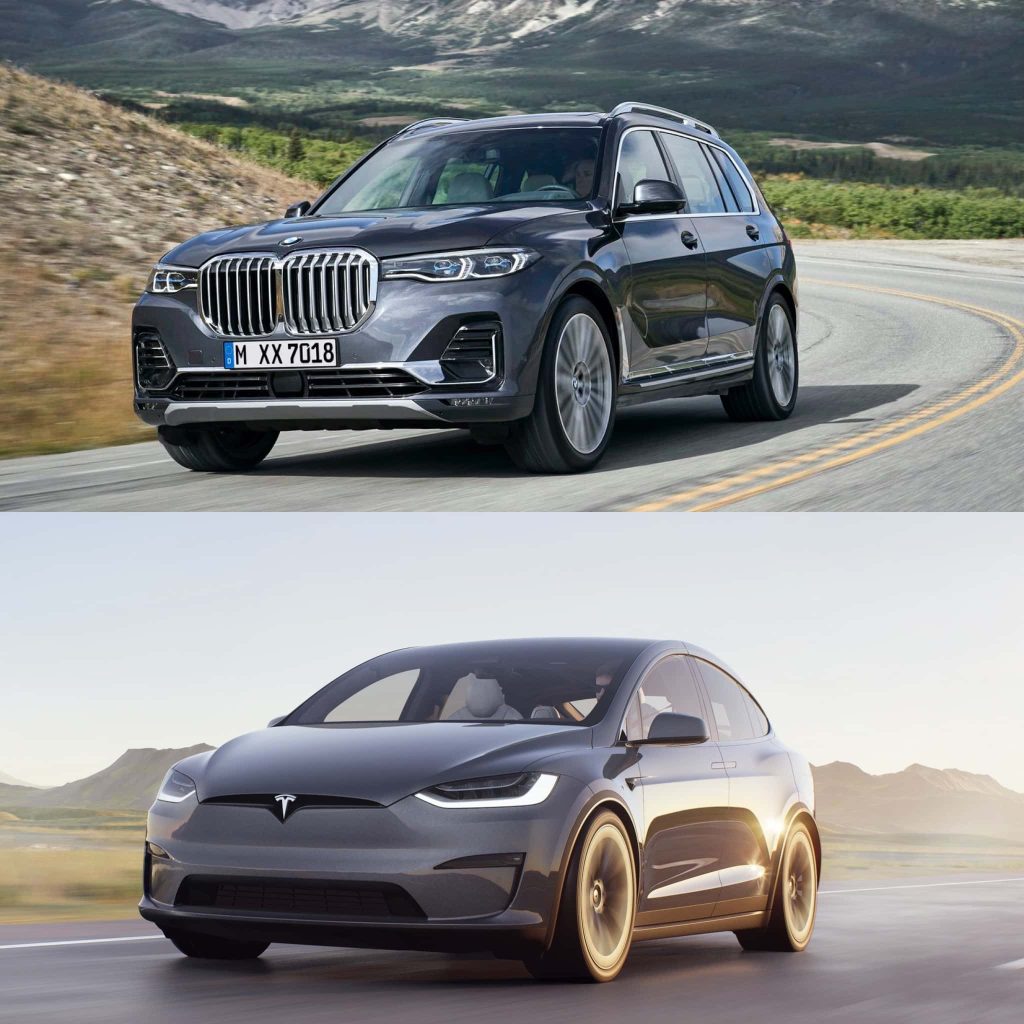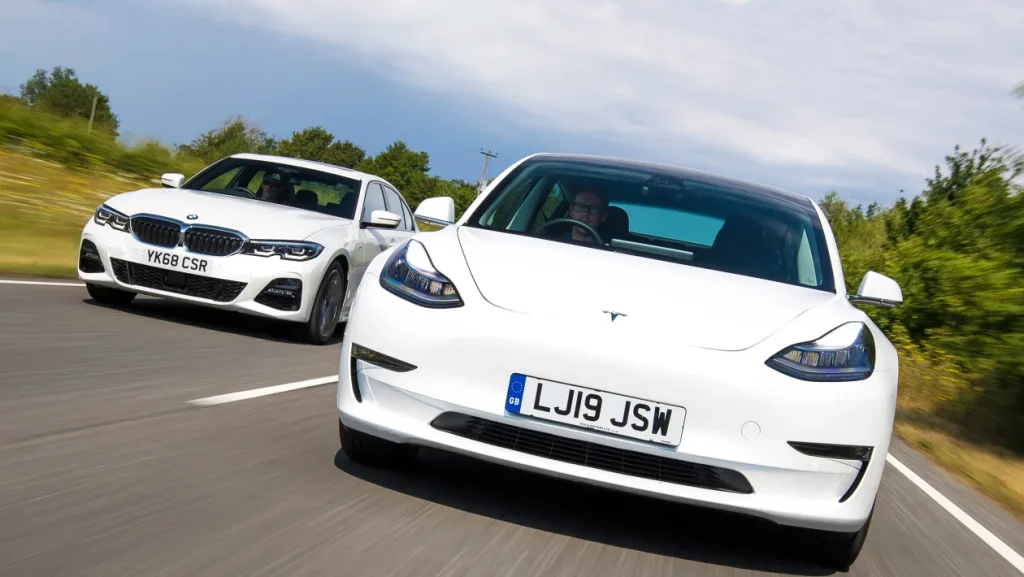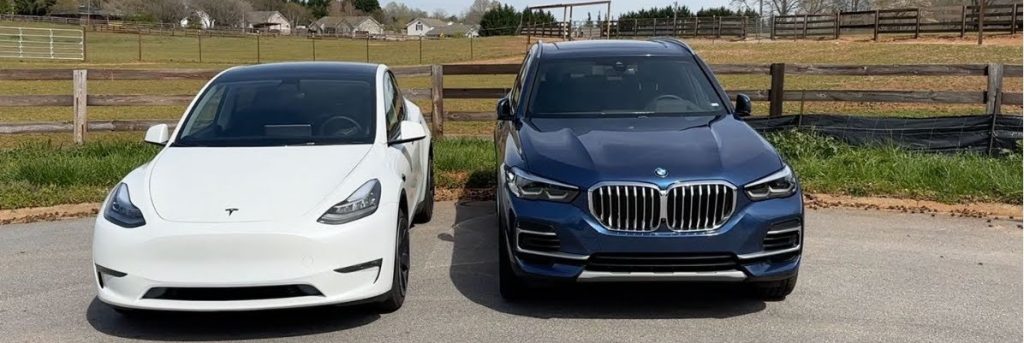So at the current time, tesla charges 50p per kwh (for almost everyone charging at home will account for most, so supercharging probably only accounts for about 10% but we will look at this later).
How does this compare? in the UK fuel is currently 165p for diesel and 147p for petrol.
Now one needs to compare like for like – it is unreasonable to compare a tesla s with a fiat punto, these are not comparable cars. So We will do it car by car. Please note, as teslas are only every electric, I will be comparing them to their nearest petrol BMW competitor – BMW does have electric cars in competition – though generally these get lower miles per kwh.
As such, I have compared the 4 main tesla cars to their nearest equivalent BMW (fair warning lots of numbers below
Tesla S
In terms of space and luxury, the Tesla S directly competes with the BMW 7 series (starting at £102,000 the price is also similar).

The BMW 7 series gets 25 mpg city driving, and 31 for highway driving. So this means a price range of 21p to 26p per mile depending on the type of driving you are doing.
The tesla s pays 50p at its most expensive per kwh (at home this is 8p) and gets 2.6-3.6 miles per kwh. So the worst case scenario tesla s is costing 19p per kwh, but in the best case scenario (about 90% of the time) we pay 7.5p per kwh and using the highest miles per kwh, we get just over 2p per mile (note that the most recent tesla s could cut this figure almost in half, as our 85 kwh car only gives us 225 on a full charge, a new one gives 400 miles on 100 kwh. As such there are only tiny places where the tesla s costs more to keep going on the road than a BMW 7 series.
The annual cost of BMW 7 filled once a week will cost around £5700, and give a driving range of a little under 400 per week. A tesla s charged twice a week, will cost at most £15 a week or £750 a year and will give you a range of about 460. Even adding in 10 or more supercharging sessions a year, tesla s comes in at under £1000. So definitely not more expensive at under 20% of the cost.
Tesla X
Costing from £73,000 (though going up to more than twice this) it is not a cheap car. The bmw petrol equivalent to the tesla x is the X3.

The tesla pays 50p at superchargers and does about 1 miles per 355 watt hours (or about 2.8 miles per kwh giving a worst case scenario of about 18p per mile. However with home chargin this drops to about 2-3p per mile.
A BMW X3 gets 29 miles per gallon at its most efficient, which is 6.4 miles per liter or 22p per mile. In city driving it gets 21 miles per gallon or 4.7 miles per liter or 31p per mile. Now the largest tank is 68 litres which gives a current fillup of just pennies under £100 for this you get about 450 miles a week.
So a BMW X3 costs about £5000 a year and gives a driving range of about 450 per week. A new tesla x can go 350 on a charge, so for £337.5 to cover 90% of driving done from home that gives you over 15,000 of daily use. Even adding in plenty of supercharging will leave your price at under £1000 a year
For the Tesla 3 (nearest competitor is BMW 3 series) and the Tesla Y (BMW X5) the sums are similar. The tesla 3 best mileage is about 5.5 miles per kwh and the Tesla y about 5.1. With smaller batteries, cost of keeping these cars on the road is likely to be nearer £700 a year or less. A BMW 3 series gives 31-46 per gallon or about 7-10 per liter, the BMW 5 series gives 20-35 per gallon or about 4.5-8 per litre – giving figures not far short of their bigger siblings (4-5000 a year).


All this is to say, that in teslas (and by extension all other electric cars) worst moments they cost about the same or less than petrol cars cost per mile at their best. Looking at the cost to keep a tesla fuelled on the road, compared to keeping a BMW fuelled tesla will always be far cheaper.
Conclusion: Even a tiny granny petrol runabout is likely to be more expensive to run over the year than a large electric SUV. As the little electric cars become more plentiful, we are rapidly going to reach a point when it is never cheaper to drive a petrol engine. It is true that second hand petrol cars come cheaper than second hand electric but that is only one small part of the cost of a car.
If your car is on the way out, make sure you start looking around. There are fewer electric cars on the second hand market so it may take longer to find what you are looking for, but it is worth it overall. Whether you are looking to save money, or like us find it s an opportunity to get a nicer car for the same price as your little old one, jump in as soon as possible.
